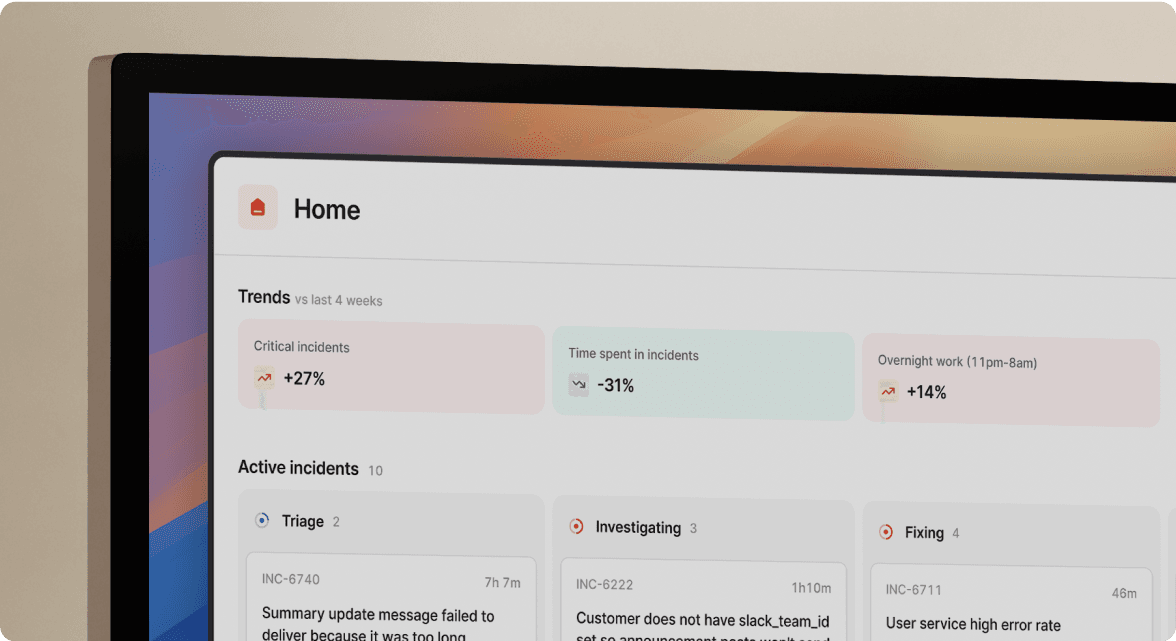Why I decided to join incident.io and my impressions so far

Why I wanted to join incident.io 🔥
In May 2025 I joined the AI team here at incident.io, in search of new and exciting engineering challenges.
It’s now been just over 2 months, so I thought I’d share some of my thoughts on why I decided to join incident.io out of all options available, and how reality has compared to my expectations.
I want to be a part of the AI revolution
Fun fact: I've been interested in AI since I watched Iron Man 2 as a wee lad and saw the "Jarvis" personal assistant, and I've wanted to be a part of building that ever since.
I went on to university to take a bachelors in CS with an Artificial Intelligence specialism, though the dream plateaued there - owing to the heavily fintech oriented job market in London.
Since GPT-3 dropped in late 2020, it's been increasingly obvious that generative AI is sooner or later going to be generating more stuff than humans ever could.
I believe the outcome of this is not that Software Engineers are going away, but that they will be shipping exponentially more code.
Every engineer knows more code == more bugs, and more bugs == more incidents.
This frankly necessitates incident management to get proportionally more productive as coding output does. Enter incident.io.
The team has aura

I've been wowed by the output and engineering presence of the incident.io team for a couple of years now, most recently the series on prompt engineering and latency reduction.
A personal goal of mine has been to write more, speak more, and ultimately just become a better builder - outside of just programming.
Seeing how almost engineer has the experience, autonomy and support to not only build amazing things, but also share their experience online or at conferences, I was hooked - I want to learn as much as possible from these lot.
Most of all, I want to be one of them.
From how people in the London tech scene spoke of incident.io, it was also clear that the engineering team radiates Aura 🧑🌾, people spoke very highly of their achievements.
That's always a good sign.
How have I found it so far?
Rewarding
I love working on a tangible project.
What that means, is I like to see the direct impact my input will have on something.
It may sound like a small thing, but at some companies, it could take weeks or months before you start to receive feedback on a shipped product.
On my third day, I was chatting with an engineer from one of our largest clients about an (albeit small) feature I had shipped to them.
You don't get that kind of feedback loop in most places.
I've joined into the AI team here at incident.io, where we are working on building an AI SRE, a feature that feels absolutely magical to see in action.
We are planning ambitiously, changing priorities ruthlessly, and shipping ultra-fast.
On my 60th day, I presented at all-hands the results of the Alpha-release of one of our upcoming AI SRE features that will help manage communications to incident stakeholders on your behalf.
The early feedback we have had from our recent release of @incident chat has been extremely positive, and the feedback from our alpha customers on in progress features is extremely promising!
The hype is absolutely real.
Competition is fierce
The vision from above is crystal clear to others at the forefront of AI adoption, that as the rest of software development gets a massive boost in productivity, incident response needs an equivalent amount of love.
Whilst growth at incident.io is very good, the prospect of an AI SRE it too tempting for our competitors to just ignore - everyone is going after this goal at a breakneck pace.
The competition are well staffed, well funded, and have a similar focus.
So we are going to work our socks off to outcompete, out of raw talent and (imho) a better vision of what a complete incident resolution product should be.
Strong values; crazy productivity
At incident.io, (especially in the AI team) we have an unlimited budget to spend on AI tools that can improve productivity, with the only requirement that you share your findings in our #ai-chat channel.
To prepare for this blog post, I asked my current favourite AI tool Claude Code to research current blog posts and mention any current themes, so how did I do?
⏺ Based on my research of incident.io's blog, I found several posts from new employees sharing their experiences. Here's what I discovered:
Key Blog Posts About New Employee Experiences:
1. "Why I joined incident.io as VP of Engineering" - Norberto Lopes reflects on his decision after two weeks
2. "Why I joined an engineering team of 6" - Martha's 6-month reflection on joining the small team
3. "My first week at incident.io" - Megan Batterbury's week-by-week breakdown
4. "How I started talking to customers in my first week" - Gabriel's intern experience
5. "They're not kidding about the pace..." - Macey Baker on shipping 2 features in her first week
6. "Five unexpected lessons from my first two months as an intern" - Lucas's reflection after 2 months
Common Themes Across Posts:
Pace & Impact: Everyone mentions the incredible speed - shipping features within days/weeks, not months
Trust by Default: New employees get meaningful responsibilities immediately, even interns
Customer Focus: Direct customer interaction from day one, including interns
Team Culture: Emphasis on collaboration, learning, and supportive environment
Technical Philosophy: Simple, intuitive architecture that enables quick onboarding
Learning Opportunities: 1:1s, documentation, and systematic support for growthFunnily enough, this maps quite well with our company values:
- ⚡ Raise the pace
- ☀️ Trust by default
- ✨ Make it magic
- 🤝 Find a way
- 🏆 Win together
On the second week of my time here, we all jetted off to Greece for the annual offsite (I know, brilliant timing on my part!).
With absolute certainty, I can tell you that everyone at this company demonstrates these 5 (quite un-corporate tbh) qualities in abundance.
I can only apologise as I repeat this in my own post...
Everyone pulls weight
The team here is dense with talent, and everyone is marching in the same direction.
I've been fortunate enough to have worked in 2 teams already at incident.io, and everyone I have worked with has been extremely helpful, willing to repeat things until they get through my thick skull, and capable of contributing to pretty much any part of the codebase at a moments notice to ship improvements to the product.
This does induce a healthy amount of imposters syndrome - nobody is entirely immune from this, and its healthy to admit. Though over the last couple of months of onboarding I’ve been ramping up on larger and larger projects, building back the confidence that drives my passion for engineering.
I'm with some of the best engineers in my career, all heads down focusing on how we can build an industry leading product that can intercept and resolve production incidents as they come up, before you wake up.
If you also want to be a part of the future of incident response at incident.io, we are hiring!

See related articles

Bloom filters: the niche trick behind a 16× faster API
This post is a deep dive into how we improved the P95 latency of an API endpoint from 5s to 0.3s using a niche little computer science trick called a bloom filter.
 Mike Fisher
Mike Fisher
My first three months at incident.io
Hear from Edd - one of our recent joiners in the On-Call team - how have they found their first three months and what's it been like working here.
 Edd Sowden
Edd Sowden
Impact review: Scribe under the microscope
In this post we review the impact of our AI-powered transcription feature, Scribe, as we analyse key metrics, user behaviour, and feedback to drive future improvements.
 Kelsey Mills
Kelsey MillsSo good, you’ll break things on purpose
Ready for modern incident management? Book a call with one of our experts today.

We’d love to talk to you about
- All-in-one incident management
- Our unmatched speed of deployment
- Why we’re loved by users and easily adopted
- How we work for the whole organization



